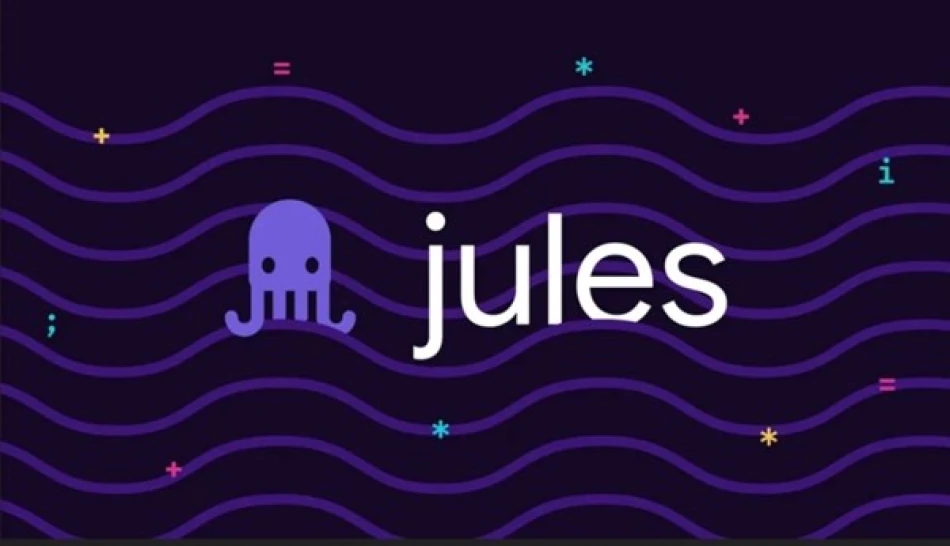
Google Officially Launches Its AI Programming Assistant 'Coels'
Google's AI Coding Agent Jules Goes Live: A Game-Changer for Software Development
Google has officially launched Jules, an AI-powered coding assistant that autonomously fixes and updates code, marking a significant milestone in the automation of software development. The tool, built on the Gemini 2.5 Pro model, integrates with Microsoft's GitHub platform and offers tiered pricing from free to $124.99 monthly, positioning Google to capture a substantial share of the rapidly expanding AI development tools market.
How Jules Works: Autonomous Code Management
Jules operates asynchronously, allowing it to work independently on coding tasks while developers focus on higher-level project requirements. The AI agent clones code repositories from GitHub and processes them within Google's cloud infrastructure, creating a seamless workflow that bridges Microsoft's dominant code hosting platform with Google's AI capabilities.
This integration strategy is particularly shrewd, as GitHub hosts over 100 million repositories and serves as the de facto standard for code collaboration. By building on this existing ecosystem rather than creating a competing platform, Google ensures immediate compatibility with developers' existing workflows.
Pricing Strategy Targets Mass Adoption
Tiered Access Model
Google's pricing structure reveals an aggressive push for market penetration. The free tier offers 15 daily tasks, sufficient for individual developers or small projects to experience the tool's capabilities. The paid tiers—$19.99 for Google AI Pro and $124.99 for Ultra—provide significantly higher usage limits, targeting professional developers and enterprise teams.
This freemium approach mirrors successful software adoption patterns, particularly in developer tools where initial free usage often leads to organizational upgrades as teams scale their AI-assisted development practices.
Market Implications: The AI Development Arms Race
Competitive Positioning Against GitHub Copilot
Jules enters a market already shaped by GitHub Copilot, which has attracted millions of users since its 2021 launch. However, Google's approach differs significantly—while Copilot primarily assists with code completion and suggestions, Jules focuses on autonomous maintenance and updates of existing codebases.
This positioning addresses a critical pain point in software development: technical debt and code maintenance, which typically consumes 60-80% of development resources in mature projects. By automating these tasks, Jules could fundamentally alter development economics.
Enterprise Adoption Potential
The rapid transition from beta to full release—just two months after its developer conference debut—suggests strong initial adoption metrics. Kathy Korevec, Google Labs' product director, cited stability improvements and quality enhancements through hundreds of updates as the catalyst for the accelerated timeline.
For enterprises, Jules represents an opportunity to reduce development costs while improving code quality consistency. Organizations maintaining large legacy codebases could see particularly significant benefits, as manual updates and bug fixes represent substantial ongoing expenses.
Broader Industry Impact
Reshaping Developer Roles
Jules exemplifies the broader trend toward AI augmentation in technical roles. Rather than replacing developers, the tool handles routine maintenance tasks, potentially elevating the profession toward more strategic, creative, and architectural responsibilities.
This shift parallels transformations in other industries where AI handles repetitive tasks while humans focus on complex problem-solving and innovation. For the software industry, this could accelerate development cycles and improve overall code quality across projects.
Cloud Infrastructure Advantages
Google's decision to process Jules operations within its cloud infrastructure creates additional revenue streams beyond subscription fees. As usage scales, computational costs for code processing could drive significant cloud service adoption, leveraging Google's AI capabilities to strengthen its position against Amazon Web Services and Microsoft Azure in the developer-focused cloud market.
Most Viewed News

 Layla Al Mansoori
Layla Al Mansoori






